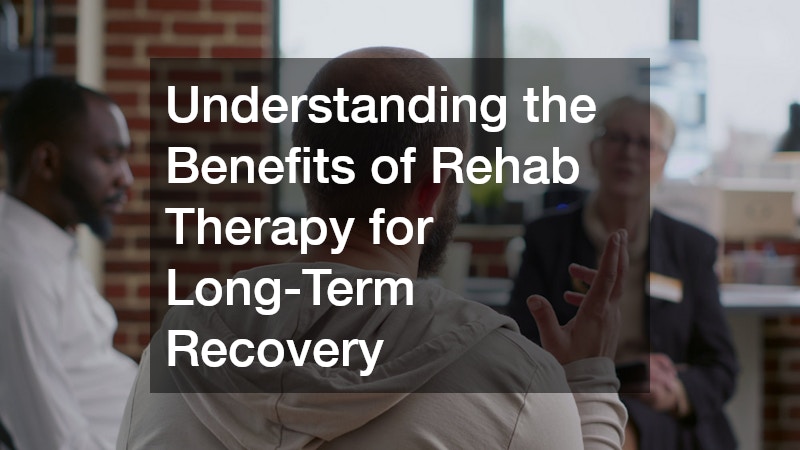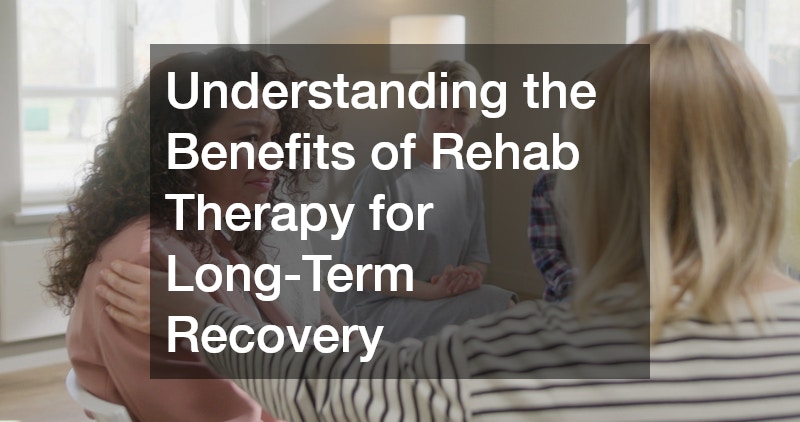In recent years, rehab therapy has emerged as a pivotal part of the recovery process for individuals seeking long-term sobriety and improved mental health. This article aims to explore the myriad benefits rehab therapy offers, addressing common questions and providing insights into its role in achieving sustained recovery. From individualized treatment plans to comprehensive healing approaches, rehab therapy provides a solid foundation for those looking to overcome addiction and mental health challenges effectively.
How Does Rehab Therapy Support Long-Term Recovery?
Individualized Treatment Plans
Rehab therapy provides tailored treatment plans that cater to the unique needs of each individual, addressing their specific substance abuse issues and co-occurring disorders. A personalized plan ensures that each person receives the most relevant interventions, thus enhancing the overall effectiveness of the recovery process.
This structured and tailored methodology often includes various therapeutic approaches aimed at addressing different facets of an individual’s addiction and behavioral patterns.
The development of individualized treatment plans involves a thorough assessment conducted by healthcare professionals. Assessments take into account the individual’s medical history, psychological condition, and social environment, creating a blueprint that guides their treatment journey. This targeted approach not only promotes better engagement during therapy but also facilitates meaningful and lasting change.
By focusing on each person’s unique challenges and strengths, personalized treatment plans help in addressing underlying issues such as trauma or co-existing mental health conditions. This level of customization leads to a more inclusive recovery path that fosters resilience and empowers individuals to take charge of their futures. Such personalized attention is crucial for achieving sustained recovery and preventing relapses.
Comprehensive Approach to Healing
The holistic approach in rehab therapy focuses on healing the mind, body, and spirit, fostering a well-rounded recovery journey. This multifaceted approach integrates various treatment modalities that collectively work towards restoring the individual’s overall well-being. Practices such as yoga, meditation, and art therapy often complement traditional therapeutic practices, creating a rich tapestry for healing.
Holistic rehab therapy recognizes that addiction affects various dimensions of an individual’s life. Thus, addressing only the physical aspect of addiction is not sufficient for truly transformative recovery. Emotional and spiritual healing processes play an equally pivotal role in supporting individuals to develop a greater awareness and connection with their inner selves.
By harmonizing various therapeutic interventions, a comprehensive approach enhances not only the immediate recovery outcomes but also fortifies long-term resilience. Such an integrative model encourages individuals to adopt healthy lifestyle changes that extend beyond the completion of rehab therapy. Emphasizing whole-person healing provides individuals with holistic tools and perspectives necessary for navigating the challenges of life in recovery.
Building Coping Mechanisms and Skills
Throughout rehab therapy, individuals learn effective coping skills and strategies to manage triggers and prevent relapse, promoting long-term success in their recovery journey. Skills such as stress management, emotional regulation, and problem-solving are crucial components of this education. Rehabilitation centers often provide dedicated sessions to practice and internalize these vital skills.
One of the key aspects of building coping mechanisms is the focus on relapse prevention strategies. Clients participate in structured sessions where they identify potential triggers and devise personalized action plans for addressing these effectively. These proactive measures equip individuals with the necessary tools to face life’s challenges without resorting to substance use.
Moreover, the acquisition of new coping skills positively influences the individual’s confidence and self-efficacy. As individuals learn to trust in their ability to handle stressful situations, their likelihood of achieving sustained recovery increases substantially. This empowerment catalyzes a transformative journey, allowing individuals to navigate their recovery path with greater assurance and stability.
What Types of Rehab Therapy are Available?
Outpatient Rehabilitation Programs
Outpatient programs offer flexibility, allowing individuals to receive therapy while maintaining their daily routines, perfect for those opting for a less intensive approach. These programs generally involve scheduled therapy sessions each week, enabling clients to integrate recovery work into their everyday lives. Outpatient rehab is ideal for individuals with strong self-discipline and a stable home environment that supports sobriety.
A significant advantage of outpatient programs is that they provide continuing care and support after inpatient treatment. Given that transition from rehab back to daily life can be challenging, outpatient therapy assists by offering ongoing therapeutic support. Clients can continue honing their coping skills and remain accountable for their recovery progress.
Despite the less immersive nature, outpatient rehab offers access to a variety of therapies, such as cognitive-behavioral therapy and support groups. This ensures that recovering individuals continually address underlying issues and reinforce healthy behaviors. The supportive network built during outpatient programs often serves as a cornerstone for maintaining long-term sobriety and overall wellness.
What Are the Long-Term Benefits of Rehab Therapy?
Enhanced Quality of Life
Overall, the positive changes brought by rehab therapy contribute to a better quality of life, increased productivity, and personal fulfillment. As individuals embrace a substance-free lifestyle, they find renewed energy and focus, channeling these into opportunities for personal and professional growth. Recovery opens up avenues for setting and achieving new goals, fostering a sense of accomplishment and purpose.
Many people experience substantial improvements in family and social relationships, as communication skills and emotional intelligence develop through therapy. Improved relationships contribute significantly to overall satisfaction and well-being. This integrative enhancement of life areas signifies a tangible transformation, redefining one’s identity and potential.
Furthermore, with newfound stability and clarity, individuals learn to pursue hobbies, career advancements, and other passions that align with their values. Such constructive lifestyle changes become more sustainable, supporting lifelong health and wellness. Ultimately, rehab therapy paves the way for a healthier, more fulfilling life, imbued with hope and future possibilities.
Rehab therapy is a cornerstone in the path to long-term recovery, offering a multitude of benefits that address the complexities of addiction and mental health. By providing individualized care, exploring different therapeutic modalities, and promoting lasting lifestyle changes, rehab therapy paves the way for a healthier, more fulfilling life. Others considering this path can gain significantly from understanding its expansive benefits, ultimately fostering hope and healing.



